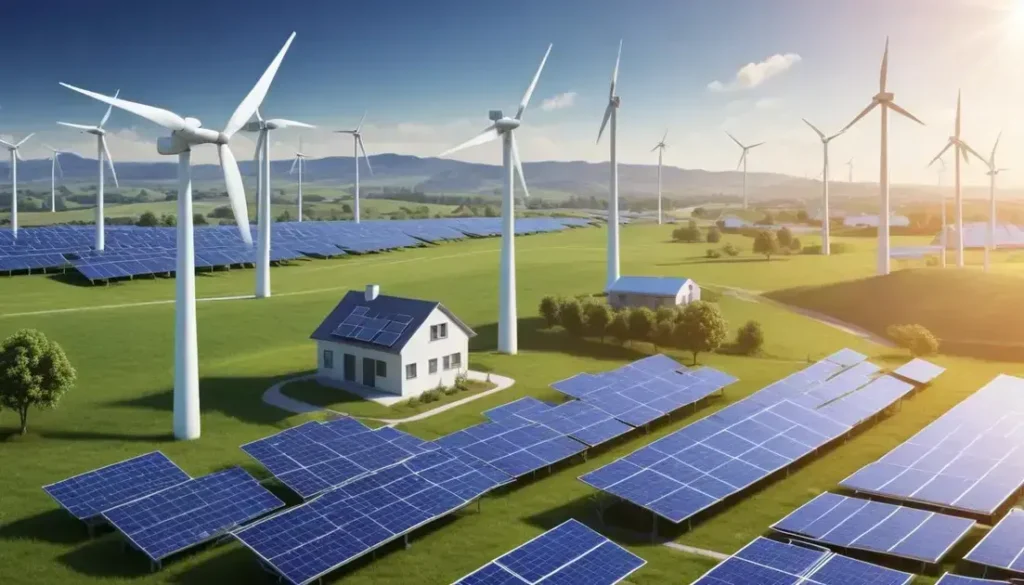The UK plays a vital role in sustainable development by committing to the United Nations Sustainable Development Goals, promoting clean energy, and fostering global cooperation to enhance food security while addressing climate change and resource management challenges.
Did you know that sustainable food systems are essential for addressing global challenges? In this article, we explore how transforming our approach can benefit the UK and beyond.
Introduction to the global food system
The global food system encompasses a complex network of processes, from production to consumption. Understanding this system is crucial for addressing current challenges in food security and sustainability. Agricultural practices vary widely across regions, influenced by climate, culture, and technological advancements.
Production and Distribution: Food is grown, harvested, processed, and transported through intricate supply chains. The reliance on fossil fuels for transportation and energy raises concerns about environmental impact. To mitigate these issues, many advocate for sustainable agriculture methods that limit chemical use and enhance biodiversity.
Moreover, demand for organic and locally sourced products is increasing, driven by consumer awareness of health and environmental issues. This shift towards sustainable practices not only helps reduce our carbon footprint but also supports local economies and promotes food sovereignty.
Global Trade and Food Security: The interconnectedness of economies means that disruptions in one region can ripple globally. Events such as natural disasters or geopolitical tensions can threaten food availability. Hence, reducing reliance on imported foods and strengthening local food systems is vital for resilience.
The importance of sustainable food production
Sustainable food production is crucial for ensuring a stable food supply while protecting our planet. It focuses on methods that reduce environmental impact, preserve natural resources, and support social equity. Traditional farming practices can lead to soil degradation and biodiversity loss, making sustainable techniques vital.
By implementing agroecological practices, farmers can improve soil health and increase crop yields. Techniques such as crop rotation, cover cropping, and organic farming minimise the need for synthetic inputs while enhancing resilience against pests and diseases. This approach not only helps the environment but also improves the nutritional quality of food.
Sustainable food production also requires efficient water management practices. As water scarcity becomes a pressing issue, strategies like drip irrigation and rainwater harvesting can greatly reduce water usage in agriculture. These methods ensure that crops receive adequate moisture without depleting local water sources.
Moreover, incorporating local knowledge and community involvement in food systems fosters a sense of ownership and responsibility. By engaging rural communities, we can support local economies and empower individuals to contribute to their nutrition security.
Current state of food security
The current state of food security remains a pressing global challenge, exacerbated by factors such as climate change, conflict, and economic instability. According to recent reports, over 800 million people worldwide experience chronic hunger, highlighting the urgent need for effective solutions.
Climate change significantly affects agricultural productivity, leading to crop failures and decreased yields. Extreme weather events, such as droughts and floods, disrupt food supply chains, making it difficult for communities to access nutritious food. Additionally, rising global temperatures threaten the viability of traditional farming practices, necessitating a shift towards more resilient methods.
Conflicts in various regions further complicate the situation, displacing populations and hindering food distribution. Conflict-affected areas often see skyrocketing food prices, which makes obtaining basic necessities increasingly difficult for vulnerable groups.
Moreover, economic downturns due to events like the COVID-19 pandemic have amplified food insecurity, with many losing their livelihoods. Addressing these challenges requires a multifaceted approach, involving innovative agricultural practices, international cooperation, and effective policy measures to strengthen food systems.
Projected population growth and challenges
The projected population growth poses significant challenges for global food systems. As the world population is expected to reach nearly 10 billion by 2050, the demand for food will increase dramatically. This surge necessitates innovative approaches to agricultural production and distribution.
Urbanisation is a key factor contributing to rising food demand. More people living in urban areas leads to increased reliance on food supply chains, often moving food from rural farms to city markets. This transition requires efficient logistics and sustainable practices to ensure food remains affordable and accessible.
Additionally, climate change threatens agricultural productivity. Changing weather patterns, droughts, and flooding can drastically affect crop yields. Farmers must adapt to these conditions by implementing sustainable practices. Innovations such as climate-resilient crops and precision agriculture can play a critical role in meeting food production challenges.
Moreover, addressing issues of food waste is vital. It is estimated that roughly one-third of food produced globally is wasted. Reducing this waste through better storage, distribution, and consumer education can help meet the needs of a growing population without the necessity to produce more food.
Economic impact of transforming food systems
The economic impact of transforming food systems is profound and multi-faceted. As the global demand for food continues to rise, enhancing agricultural practices becomes essential for achieving sustainable economic growth. Transitioning to more efficient and sustainable food production methods can lead to substantial economic benefits.
Investing in sustainable agriculture can increase productivity and reduce costs in the long run. Practices such as organic farming and agroecology not only improve soil health but also increase resilience against climate change. This resilience means farmers can maintain consistent yields, which stabilises local economies and creates jobs.
Furthermore, strengthening local food systems helps stimulate rural economies. By supporting smallholder farmers and local producers, communities can reduce reliance on imported goods, thereby retaining more economic value within the area. This localised approach not only promotes food security but also fosters community engagement and investment.
The shift towards sustainable food systems also opens up new markets. Consumer demand for responsibly-sourced and organic products is on the rise. Companies that adapt to these trends can capture market share and improve their brand reputation. Additionally, embracing technological innovations in agriculture enhances efficiency and can lead to greater profitability.
Food production and climate change
Food production is intricately linked to climate change, with rising temperatures, unpredictable weather patterns, and extreme weather events directly impacting agricultural practices. As the climate changes, traditional farming methods are increasingly challenged, necessitating urgent adaptations to ensure food security.
One major issue is the increased frequency of droughts and floods, which can devastate crops and disrupt planting cycles. Farmers must employ new strategies, such as drought-resistant crop varieties and improved irrigation techniques, to withstand these fluctuations. Sustainable farming practices, like conservation tillage and agroforestry, also play a crucial role in building resilience against climate impacts.
Moreover, climate change affects the distribution of pests and diseases, which can result in greater crop losses. Integrated pest management and organic approaches are essential to mitigate these risks while maintaining a healthy ecosystem. This shift not only helps secure food supplies but also enhances soil health and biodiversity.
To tackle these challenges effectively, collaboration among governments, scientists, and farmers is vital. Developing climate-smart agriculture practices that adapt to changing conditions can enhance productivity while reducing greenhouse gas emissions. This holistic approach is critical for creating a sustainable food system that can withstand the impacts of climate change.
Reducing hunger through sustainability
Reducing hunger through sustainability is a crucial focus as global awareness of food security issues grows. Sustainability offers solutions that not only enhance food production but also ensure that communities have access to nutritious food. By adopting sustainable agricultural practices, we can increase crop yields while protecting the environment.
Agroecology is one approach that promotes biodiversity and soil health. This method encourages the cultivation of diverse crops, reducing the risk of total crop failure and ensuring a steady food supply. Implementing crop rotation and intercropping can enhance soil fertility and resilience against pests, leading to more robust harvests.
Additionally, reducing food waste is essential in the fight against hunger. Approximately one-third of food produced globally is wasted, squandering valuable resources and contributing to greenhouse gas emissions. By improving food distribution systems and promoting consumer awareness, we can minimise waste and ensure that surplus food reaches those in need.
Community engagement is also vital. Empowering local communities to grow their own food fosters a sense of ownership and responsibility. Initiatives such as community gardens and urban farming not only improve food access but also create social connections and enhance local economies. Ultimately, sustainable practices can transform food systems and help reduce hunger effectively.
Role of technology in food systems
The role of technology in food systems is rapidly evolving, bringing about innovative solutions to enhance efficiency and sustainability. Modern technologies such as precision agriculture, data analytics, and biotechnology play a crucial part in transforming how food is produced, processed, and distributed.
Precision agriculture allows farmers to monitor and manage their crops more effectively. Using sensors, drones, and satellite imagery, farmers can gather real-time data on soil conditions, crop health, and weather patterns. This information enables them to make informed decisions, optimise resource usage, and increase yield while minimising environmental impact.
Furthermore, advancements in biotechnology have led to the development of genetically modified organisms (GMOs) that are more resilient to pests and diseases. These innovations help secure food sources and reduce reliance on chemical pesticides, contributing to a more sustainable food system.
Data analytics also plays a significant role in streamlining food supply chains. By analysing consumer trends and purchasing patterns, businesses can better manage inventory and reduce waste. Moreover, blockchain technology enhances traceability, allowing consumers to know the origins of their food, thus fostering transparency and trust.
Economic gains from sustainable practices
Economic gains from sustainable practices in agriculture are increasingly becoming evident as businesses and communities adopt more environmentally friendly methods. Transitioning to sustainable farming not only helps the planet but also enhances profitability for farmers.
Implementing sustainable practices can significantly reduce costs. Techniques such as crop rotation and organic farming improve soil health, leading to better yields over time. With healthier soil, farmers may find they spend less on synthetic fertilizers and pesticides, directly boosting their bottom line.
Moreover, sustainable practices open new market opportunities. As consumers become more environmentally conscious, there is rising demand for organic and sustainably sourced products. Farmers who adapt to these trends can command higher prices for their goods, thereby enhancing their revenue. This shift can also improve a farm’s resilience to market fluctuations.
Additionally, sustainable farming can lead to long-term economic stability. By maintaining biodiversity and conserving resources, farmers are better equipped to cope with challenges such as climate change and resource scarcity. This stability not only benefits individual farmers but also supports local economies by creating jobs and fostering community well-being.
Regional disparities in food availability
Regional disparities in food availability highlight a significant challenge in achieving global food security. Access to nutritious food varies widely across different regions, influenced by factors such as geography, economic conditions, and infrastructure.
In many low-income countries, food scarcity results from poor agricultural practices and inadequate investments in food production. Limited access to technology and fertilisers reduces crop yields, leaving communities vulnerable to hunger. Additionally, logistical challenges in transporting food from rural areas to urban centres often exacerbate these issues.
Conversely, wealthier regions experience food surpluses, but they may still face problems related to food distribution and waste. Urban areas often have access to a wide variety of foods, yet low-income populations within these settings may struggle to afford nutritious options. Consequently, food deserts emerge, where healthy foods are scarce or unaffordable.
Addressing these disparities is crucial for improving overall food security. Initiatives that promote local production, enhance market access, and improve infrastructure can help bridge the gap between regions. Community-supported agriculture and food cooperatives are examples of strategies that empower local farmers while providing access to fresh produce for consumers.
The necessity for global cooperation
The necessity for global cooperation in addressing food security challenges cannot be overstated. As the world becomes increasingly interconnected, the complexities of food systems require collaborative efforts among nations, organisations, and communities. Global cooperation is essential for sharing knowledge, resources, and best practices to tackle pressing issues like hunger and malnutrition.
One of the key areas for cooperation is in agricultural research and development. By pooling resources and expertise, countries can develop innovative solutions to improve crop resilience, sustainable farming practices, and food production techniques. Collaborative initiatives also facilitate the exchange of technology and information, helping to enhance the capabilities of farmers, especially in developing nations.
Additionally, international trade agreements play a crucial role in promoting food security. Effective trade policies can ensure that food production meets global demands while being mindful of local food security needs. By working together, nations can create fair trade agreements that benefit both producers and consumers.
Furthermore, global cooperation is vital in addressing the impacts of climate change on food systems. Joint efforts in climate adaptation and mitigation strategies can help protect vulnerable communities and ensure food availability. By fostering partnerships at all levels, we can build resilient food systems and create a sustainable future for all.
UK’s role in sustainable development
The UK’s role in sustainable development is pivotal as the nation works towards achieving its environmental and social goals. As a leader in advocating for sustainability, the UK has implemented various policies that promote responsible resource management and reduce greenhouse gas emissions.
One significant aspect of the UK’s approach is its commitment to the United Nations Sustainable Development Goals (SDGs). By aligning national strategies with these global objectives, the UK aims to tackle pressing issues such as poverty, inequality, and climate change. The government actively engages in initiatives that support clean energy, sustainable agriculture, and biodiversity conservation.
Moreover, the UK has leveraged its influence in international forums to drive action on climate change. Hosting events like the UN Climate Change Conference (COP) allows the UK to foster cooperation among nations and share best practices in sustainability. These events highlight the importance of collective action in addressing global environmental challenges.
The UK also invests in green technologies and supports innovation in the private sector. Encouraging businesses to adopt sustainable practices not only helps the economy but also contributes to long-term environmental goals. By emphasizing the need for sustainability across all sectors, the UK sets a benchmark for other countries to follow.
Conclusion: Future perspectives
The future of food systems hinges on a commitment to sustainability and collaboration. As populations grow and climate challenges intensify, the need for innovative solutions becomes imperative. Sustainable practices can enhance food security while protecting our planet’s resources.
Investing in technology and research is crucial. By harnessing advancements such as biotechnology and data analytics, agricultural productivity can be improved. Moreover, these technologies must be accessible to farmers globally, especially in developing regions, to ensure that all communities benefit.
Global cooperation will also play a vital role in addressing food challenges. Countries must work together to share resources, knowledge, and best practices. Initiatives like international trade agreements can promote food access and security across borders.
Consumer awareness is another key factor. As individuals become more informed about sustainability, their choices can drive demand for responsibly sourced products. This shift can encourage businesses to adopt sustainable practices that benefit both the economy and the environment.
Ultimately, the future of food systems requires a united approach combining technology, sustainability, and cooperation. By prioritising these elements, we can create resilient food systems that thrive in the face of future challenges.
In Summary: Building a Sustainable Future
Creating a sustainable future for food systems is essential for addressing global challenges. By focusing on sustainable practices, investing in technology, and fostering global cooperation, we can improve food security for all.
Consumer awareness also plays a critical role. When individuals choose responsibly sourced products, it encourages businesses to adopt more sustainable methods.
As we move forward, it is important to work together to share knowledge and resources. This collaborative approach will help create resilient food systems that can adapt to future challenges.
By prioritising sustainability and innovation, we can build a better food system that benefits everyone and protects our planet.
Frequently Asked Questions
What are the key challenges in achieving food security globally?
The main challenges include climate change, regional disparities in food availability, and inadequate agricultural practices in certain areas.
How can sustainable farming practices benefit the environment?
Sustainable farming enhances soil health, reduces chemical usage, and promotes biodiversity, thereby protecting ecosystems.
What role does technology play in modern food systems?
Technology helps improve agricultural productivity, facilitates better supply chain management, and enables data analysis for informed decision-making.
Why is global cooperation important for food security?
Global cooperation allows countries to share resources, knowledge, and best practices, making it easier to address food security challenges collectively.
How can consumers contribute to sustainable food systems?
Consumers can support sustainable food systems by choosing responsibly sourced products and reducing food waste.
What is the impact of climate change on food production?
Climate change can lead to increased frequency of extreme weather events, affecting crop yields and food availability, thus necessitating adaptation strategies in agriculture.


